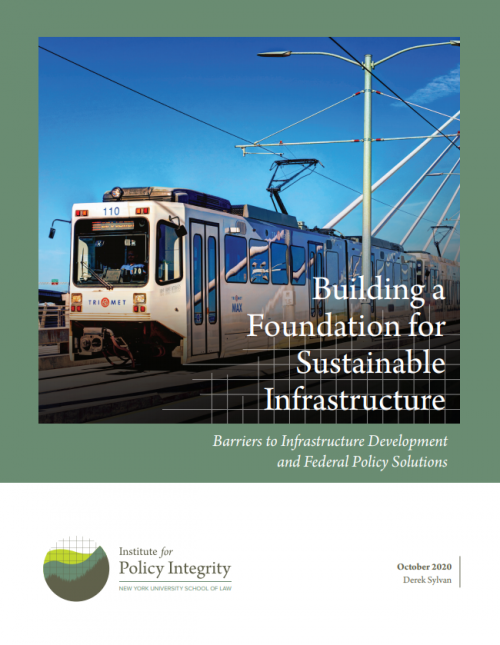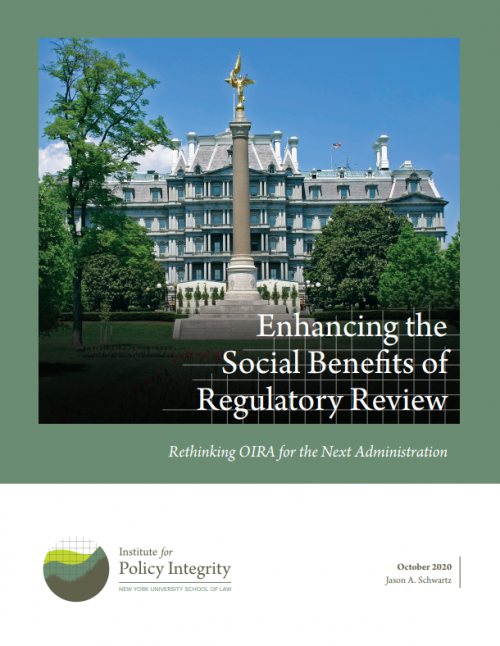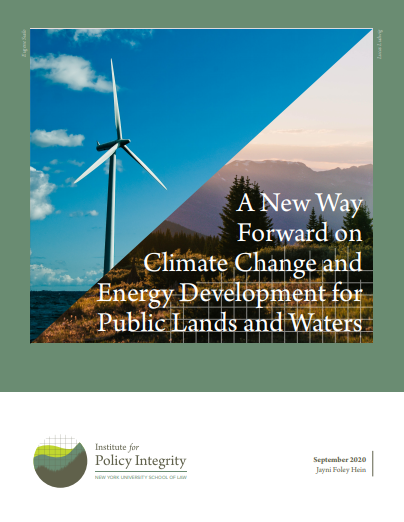-
Presidential Transition Guidance
As the presidential transition begins, the Institute for Policy Integrity has outlined recommended policy priorities for the Biden administration on climate, energy, and environmental policy, and related social equity outcomes. It is crucial that the incoming administration undertake aggressive reforms that are grounded in science and economics. In recent months, we published a series of reports highlighting actionable, near- and medium-term policy recommendations in several key areas.
-
Comments to FERC on Iroquois Project
The Federal Energy Regulatory Commission’s (FERC) environmental assessment for the Iroquois Gas Transmission System’s Enhancement by Compression Project -- which calls for four natural-gas compressor stations in New York -- fails to estimate the project's downstream or upstream greenhouse gas emissions, and falsely suggests that the project may fully substitute for other sources of fossil-fuel energy. We submitted comments calling on FERC to quantify and monetize greenhouse gas emissions, and rebutting the suggestion that the project will not increase total emissions.
-
Building a Foundation for Sustainable Infrastructure
Barriers to Infrastructure Development and Federal Policy Solutions
Most categories of American infrastructure—from transportation and water systems to public school buildings and electricity meters—are in dire need of modernization, and climate change is compounding this challenge. Our report provides policy recommendations at each stage of the infrastructure lifecycle, from project planning and analysis, through financing, construction, and maintenance. We explain how a realigned approach to infrastructure can boost the economy while addressing threats from climate change and prioritizing social equity goals.
-
Amicus Briefs on Repeal of Fracking Rule
In 2017, the Bureau of Land Management (BLM) repealed an Obama-era rule that tightens environmental regulations for fracking on public lands. We filed an amicus brief detailing BLM’s irrational analysis of the repeal, which erases the rule’s significant net benefits and flouts longstanding standard practices.
-
Enhancing the Social Benefits of Regulatory Review
Rethinking OIRA for the Next Administration
In recent years, federal leadership has distorted the practice of regulatory analysis and has eroded the integrity of the government’s regulatory review structure as coordinated by the Office of Information and Regulatory Affairs (OIRA). The result has been a torrent of deregulatory actions that have worked against the best interests of the American people and their health, safety, environment, and financial well-being. Our report details the path forward on regulatory review, which is to first surgically excise recent distortions, and then to reaffirm the best principles and practices from the past, while adding key corrections and enhancements. Implementing the reforms recommended in this report will refocus OIRA on helping agencies once again use regulations to maximize net social welfare.
-
Comments to BLM on Oil and Gas Leasing in Utah
Despite being ordered to provide a more thorough analysis of greenhouse gas emissions by a U.S. district court, the Bureau of Land Management (BLM) failed to adequately consider emissions from a number of oil and gas leases in Utah. We submitted comments recommending that BLM use the social cost of carbon to weigh climate impacts and, further, assess the option value of deferring lease sales to improve its land management decisions.
-
Comments on Climate Damages from Farmington Mancos-Gallup RMP
The Bureau of Land Management and the Bureau of Indian Affairs forecast that resource management in New Mexico's Farmington Mancos-Gallup region would produce more than 300 million metric tons of cumulative greenhouse gas emissions under their preferred alternative. Our joint comments explain that the agencies should better evaluate the proposal's climate impacts using the social cost of greenhouse gases. We also submitted comments focused on the agencies' obligation to conduct environmental justice analysis under Executive Order 12,898.
-
A New Way Forward on Climate Change and Energy Development for Public Lands and Waters
The Department of the Interior has yet to develop a comprehensive plan to accurately account for, manage, and mitigate the greenhouse gas emissions that result from the extraction and combustion of fossil fuels from public lands and waters. This document describes immediate and longer-term actions that Interior’s Bureau of Land Management and Bureau of Ocean Energy Management should take to reform public lands management consistent with climate change, conservation, and fiscal reform priorities.
-
Amicus Brief in Appeal of Conscience Protections Decision
Last fall, three federal courts—in the Southern District of the New York, the Northern District of California, and the Eastern District of Washington—vacated the Department of Health and Human Services’ conscience rule, which sought to expand healthcare providers’ rights to deny care on religious or moral grounds. In amicus briefs supporting the vacatur, Policy Integrity criticized HHS for, among other things, failing to consider the new policy’s likely health costs for women and LGBT individuals.
-
Comments to EPA on Airplane Emissions Regulations
The Environmental Protection Agency (EPA) proposed airplane pollution standards that have no effect on emissions and require no technological improvements. EPA does analyze one scenario in the technical support for the proposal, however, that appears to have modest greenhouse gas emissions reduction effects. But the agency improperly monetizes and weighs those reductions. We submitted joint comments that detail flaws in EPA’s analysis and describe how the agency can correctly apply the social cost of carbon.










